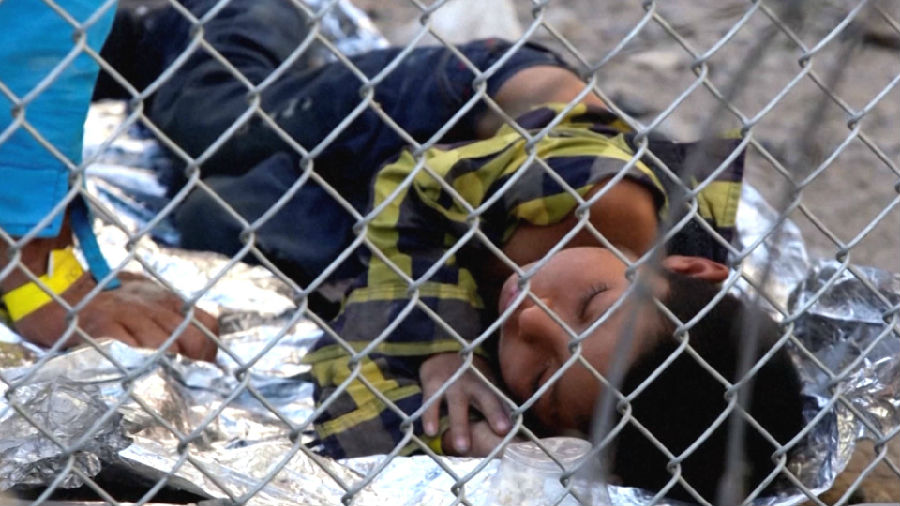A few decades after the Bath Riots, Mexico started sending men to work on US farms and railroads,
洗澡骚乱过去了几十年后,根据新劳工协议“墨西哥短期合同工计划”,
as part of a new labor agreement called the Bracero program.
墨西哥开始向美国农场和铁路输送工人。
And through the program, the border disinfections continued.
边境的消毒工作依托这个项目继续进行着。
Here in this facility, some migrants were sprayed with insecticides.
在这个工厂,一些移民被喷了杀虫剂。
This time, it was a substance called DDT. "Dichloro Diphenyl Trichloroethane"
这一次,给他们喷的是一种叫做“双对氯苯基三氯乙烷”(DDT)的物质。
A toxic pesticide, which, decades later, would be banned for agricultural use by most developed countries.
几十年后,这一农药在大多数发达国家都被禁止用于农业了。
"Repeated contact must be avoided."
“严禁重复接触。”
"They were sprayed in the face.
“他们的脸上被喷了DDT。
They were sprayed in their private parts.
私处也被喷了DDT。
And you know they were stripped naked and inspected and sometimes they're inspected like you would inspect livestock."
而且,你知道嘛,他们被剥光衣服检查,有时检查的方式就跟检查牲畜一样。”
Firsthand accounts from immigrants in the program reveal how little they knew about the fumigations.
当年受害的移民的一手资料显示,他们对消毒的本质几乎一无所知。
"So they talk about how humiliating it was.
“他们只说到了被检查有多丢脸。
About 'why do they think we're so dirty.'
说到了“为什么他们认为我们这么脏。’
They all call it the 'white powder.'
他们都叫那个农药‘白粉’。
I don't know if they necessarily were told we’re spraying you with DDT, but they all call it “el polvo” the powder."
我不知道他们是否被告知过我们在向你喷的是DDT,但他们都叫它“el polvo”(即粉末)。
"The miraculous white powder that is helping to win the war, against disease."
“神奇的白色粉末正在帮助我们赢得战争,对抗疾病。”
Many of the employees who worked in the facilities weren’t given many details either.
许多在工厂工作的员工也没有了解到太多细节。
"When I first started my role was a clerk, I got the job mainly because I spoke Spanish.
“我一开始得到了一份文书的工作,能得到这份工作主要是因为我会说西班牙语。
There was a hut in the area when they came in from the Mexican side that they would go in there.
他们从墨西哥那边过来的时候,会进到一个小屋里面。
And they had some sort of, it was for lice they said, to you know, disinfect for lice.
他们会接受某种,据说是为了灭虱子的消毒处理。
And we never gave it much thought ,but we did think, that’s sort of like what the Nazi’s used to do, you know to the Jews."
我们从来没有多想,但我们确实想过,这有点像纳粹过去对犹太人做的事情。”
"I had heard during lunch breaks that they would spray them.
我曾在午休的时候听说他们会给我们身上喷东西。
And sometimes there were comments from the men themselves that they would put a hose to them.
有时,那些人自己也会说,他们会用水管插他们。
I don’t know if they knew what they were doing to them, I certainly didn’t know, didn't.
我不知道,他们是否知道他们对他们做了什么,我当然是不知道的。
It was farfetched from the world we lived in."
因为那些东西距离我们生活的世界太遥远了。
It wasn’t until the 1960s, when the Bracero program ended, that health authorities acknowledged the chemicals were dangerous,
直到20世纪60年代,墨西哥短期合同工项目结束时,卫生当局才承认那些化学物质是危害性的,
and the baths and fumigations were finally discontinued.
洗澡和熏蒸的操作也才停了下来。
"You want history to be about progress.
“我们希望历史是关于进步的历史。
about, everybody realizes how horrible it is and then it stops.
关于每个人都意识到,这样的做法有多可怕,继而停止这种做法的历史。

Unfortunately you know that's how it works in movies.
不幸的是,这样的事情只会发生在电影里。
But this was the border, right?
这可是边境啊,对吧?
And in the border a lot of things never become resolved.
在边境地区,很多问题都是一直没有得到解决的。
They just keep on repeating themselves."
那些问题就那么周而复始地轮番上演。”
Decades after the disinfection campaign ended,
即便消毒运动结束了几十年,
the language, the strategy, and the dehumanizing politics of fear and exclusion still linger.
恐惧和排斥催生的语言、策略以及非人性化政治并没有消失。
"It’s a health issue too because we don’t know what people have coming in here."
“这也是一个健康问题,因为我们不知道来的都是些什么人。”
"They’re coming in with diseases such as smallpox, and leprosy and TB that are going to infect our people in the United States."
“他们携带着天花、麻风病和结核病等各种疾病,这些疾病都会感染我们美国的老百姓。”
"It’s just a fact, you’re going to see disease outbreak."
“事实就是这样,会引发疾病爆发的。”
"Apprehensions in the El Paso area specifically have spiked more than 600 percent."
“尤其是埃尔帕索地区,那里的恐慌情绪已经上涨了5倍。”
"They are essentially being warehoused as many as 300 children in a cell."
“关在一个小房间的儿童就多达300名。”
"Without adequate food, water and sanitation."
“没有足够的食物、水和卫生条件供应。”
"The United States is running concentration camps on our southern border."
“美国正在我国南部边境搞集中营。”
"I don’t like anything compared to the Holocaust."
“我不喜欢拿任何事情与大屠杀比较。”
"Why can’t you compare it, his practices to what led up to the Holocaust?"
“为什么不能把它,把他的行为和导致大屠杀的原因做个比较呢?”
"Do we have to wait for the actual Holocaust before we speak out?”
“一定得等到大屠杀真的发生了才能说吗?”
At the border between Juarez and El Paso, the same space where the bath riots once happened,
如今的华瑞兹-埃尔帕索边境,这个曾经发生洗澡骚乱的地方,
hundreds of migrants have been huddled in makeshift, detention centers.
依然有成百上千的移民挤在临时的拘留中心。
They’ve been waiting, to find out if the US government, deems them fit for entry.
他们依然在等待美国政府是否认为他们适合入境的结果。











